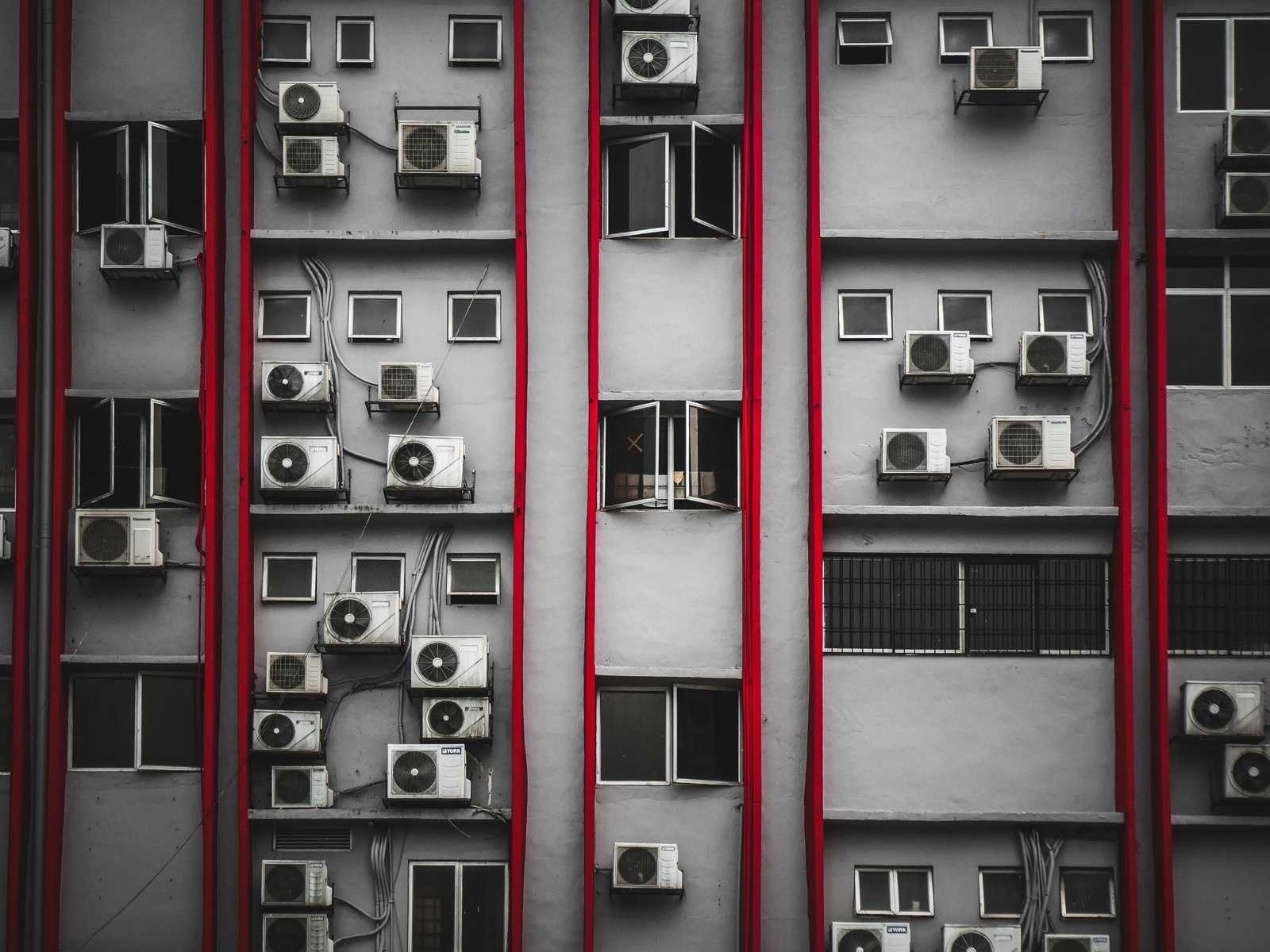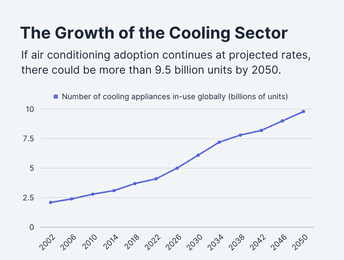To Stop Record Heat Waves, We Have to Fix Air Conditioning
By Kevin Purdy

This week, 235 million Americans will experience temperatures hotter than 90 degrees. 60 million people will experience temperatures hotter than 100 degrees Fahrenheit. For many of these people, it will feel even worse than the number reads, as humidity makes it feel 10-15 degrees hotter.
As the latest heat wave smashes temperature records across the country, people will seek refuge in air-conditioned spaces, whether homes, offices, vehicles, or public cooling shelters. But unless we fix up our A/C systems, that refuge comes with a cost.
Energy use for cooling around the world more than tripled between 1990 and 2020, and has only risen as more people work from home. Air conditioning is now 13% of the world’s total electricity demand, according to the United Nations and International Energy Agency (IEA). Most of that electricity is produced using fossil fuels like coal and natural gas.
But that’s just the energy cost of today’s air conditioning. If air conditioning adoption continues at projected rates, there could be more than 9.5 billion units by 2050, compared to the current 3.6 billion today, according to the Green Cooling Initiative. If we somehow gave air conditioning to everybody who needs it, not just those who can afford it, that number would be more like 14 billion units.
Source: University of Birmingham, “A Cool World: Defining the Energy Conundrum of Cooling for All,” 2018.
But cooling things down like this makes the whole planet hotter. Air conditioning accounts for 11.8% of the world’s direct carbon emissions. By 2050, cooling (including refrigerators) could cause 18 billion tons of emissions, about half the total global CO2 emitted today, according to the IEA. That’s not even factoring in the warming effects of the hydrofluorocarbons in refrigerants (we’ll tackle those in a bit).
The more emissions, the hotter the planet. The hotter the planet, the more people buy air conditioners. The more those units run, the more emissions we produce.
It’s a vicious cycle. So how do we stop it?
The world needs better air conditioners and refrigerants, yesterday
Like many climate change problems, the solutions to our vicious A/C cycle involve many technologies and tools we already have. Nothing fantastical needs inventing, but major action needs to happen.
The average efficiency rating of air conditioners increased only 10% since 2010, and most of the A/C units sold are only 10-30% better than the worst-performing products, according to IEA. There are many models available that are 30-70% more efficient, and some higher-end units are 2-3 times as efficient as the average. We could buy better–and we’d do it much faster if there was help and incentives.
Our air conditioners and refrigerators, efficient or otherwise, are powered by some very damaging refrigerants (or hydrofluorocarbons). Climate scientists measure the damage of such materials in GWP, global warming potential, which is a measure of how much more quickly they warm our planet than carbon dioxide. The average GWP found in most air conditioners today is 1,360.
Source: Cooling Emissions and Policy Synthesis Report, UN/IEA
According to a recent report by leading climate scientists, if we replaced every air conditioner and refrigerator with the highest-efficiency, best-refrigerant models by 2030, we could save 460 billion tons of greenhouse gasses over the next 40 years. To put that in perspective, the entire world emits about 50 billion tons of greenhouse gasses every year.
In addition to the emissions reductions, this efficiency campaign would save an equivalent amount of electricity produced by all the coal-fired power produced by China and India in 2018, roughly $2.9 trillion worth.
What if we just powered all the A/C with renewable energy?
You might be tempted to think the solution is to just build more renewable energy. But when it comes to climate action, there are no silver bullets.
Simply put, there are too many air conditioners now, and in the future, to sit back and assume the grid will save us. A University of Birmingham study suggests that, even with good efficiency improvements, cooling will consume nearly 2.5 times as much energy as climate scientists have budgeted for cooling in a renewable-grid future.
So even if we did magnificent work at switching to green power—the kind that would keep global warming below 2 degrees Celsius—cooling will eat up between 50-80% of the projected renewable energy we’d have by 2050. If we didn’t improve cooling efficiency much, it could easily consume all the power we have.
Without a worldwide push for efficiency, better refrigerants, and a much greener grid, we’re stuck in the emissions/temperature/cooling loop.
So what can I do?
Even though you’re just one person on this planet, you likely have access to everything you need to do the most good.
When it comes time to replace your air conditioner, consider buying a heat pump. Heat pumps, despite their bad name, are very efficient air conditioners that can also heat your home — and they can do it 3-4x more efficiently than furnaces, baseboards and boilers.. After all, it’s not just summer emissions heating the world up, it’s all of them, all year round.
Most people in the U.S. today can’t buy a refrigerator, air conditioner, or car that utilizes lower-emission refrigeration. But if the Kigali Amendment, an update to the 1987 Montreal Protocol that successfully reduced ozone depletion, passes the U.S. Senate, you could have more options in coming years. If you live in a state with a Republican Senator, ask them to vote to amend the Kigali Amendment. This is a rare climate bill that some Republicans may actually vote for.
Similarly, you can support Rewiring America, an organization that, among many other things, advocates for rebates on efficient, electric home appliances, like heat pumps. We’re past the point where we can wait to see if The Market solves our efficiency gap—we need smart government policy.
On a very local level—local as in your living room—install a smart thermostat, or ask your landlord for one. Perhaps the easiest efficiency fix for air conditioning is to not have it run so hard when nobody’s around to enjoy it.
Finally, you can do your part to foster a greener grid. You can sign up for community solar, install panels on your roof, or simply let your local representatives and public utility commission know you want more renewables on the grid.
If we get too comfortable and complacent with our middling A/C now, we’ll struggle to keep them running when every summer after this breaks another record.

